Table of Contents
When it comes to choosing the right email marketing platform, Constant Contact vs Mailchimp is one of the most debated comparisons. Both platforms offer powerful tools to help businesses grow their email lists, engage their audience, and drive sales. However, they cater to different needs and preferences, making it essential to understand their strengths and weaknesses before deciding which one is best for you.
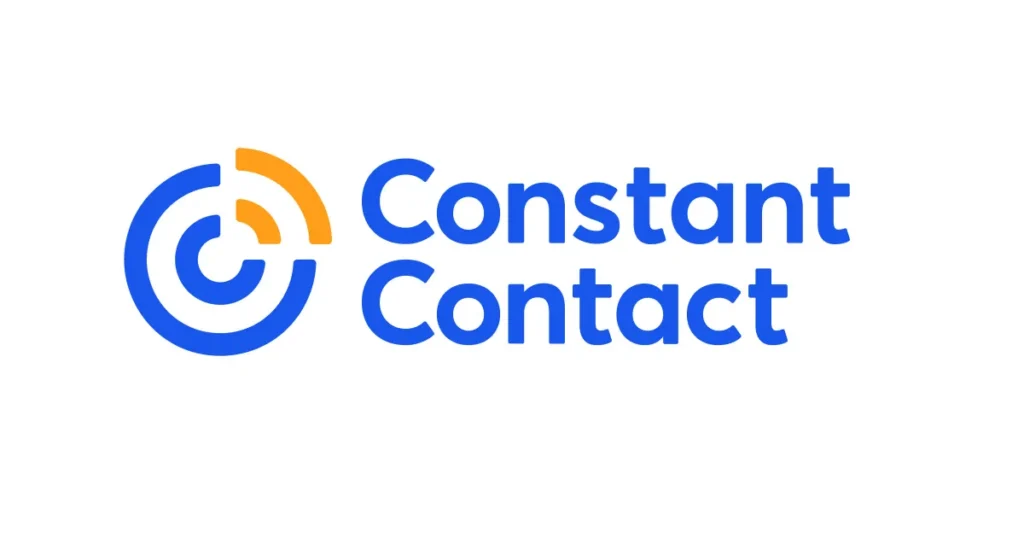

In this article, we’ll compare Constant Contact vs Mailchimp in various key areas, such as pricing, ease of use, automation, integrations, and more. Whether you’re a small business owner, an eCommerce store, or a content creator, this guide will help you make an informed choice.
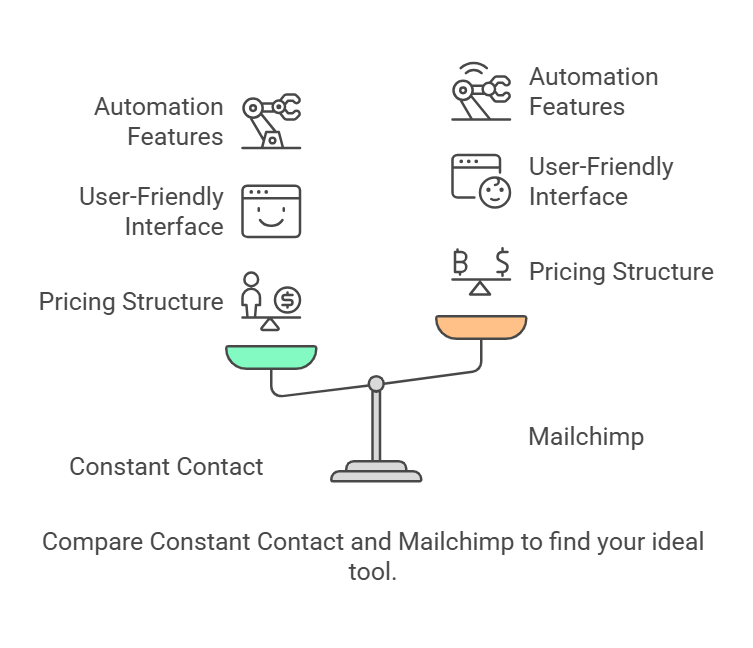
Pricing & Plans
One of the most important factors in choosing an email marketing platform is pricing. In this Constant Contact vs Mailchimp comparison, we’ll break down their pricing structures and help you determine which one offers better value for your needs.
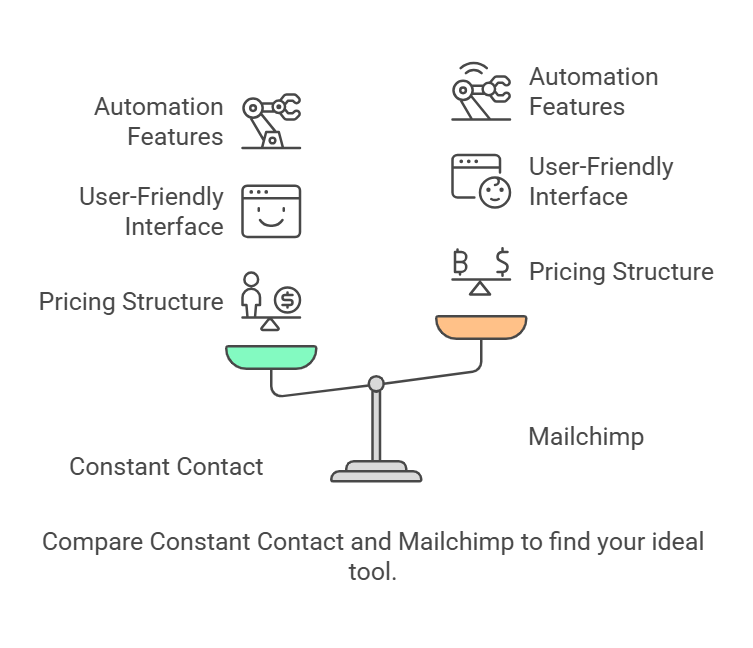
Constant Contact Pricing
Constant Contact offers two main pricing plans:
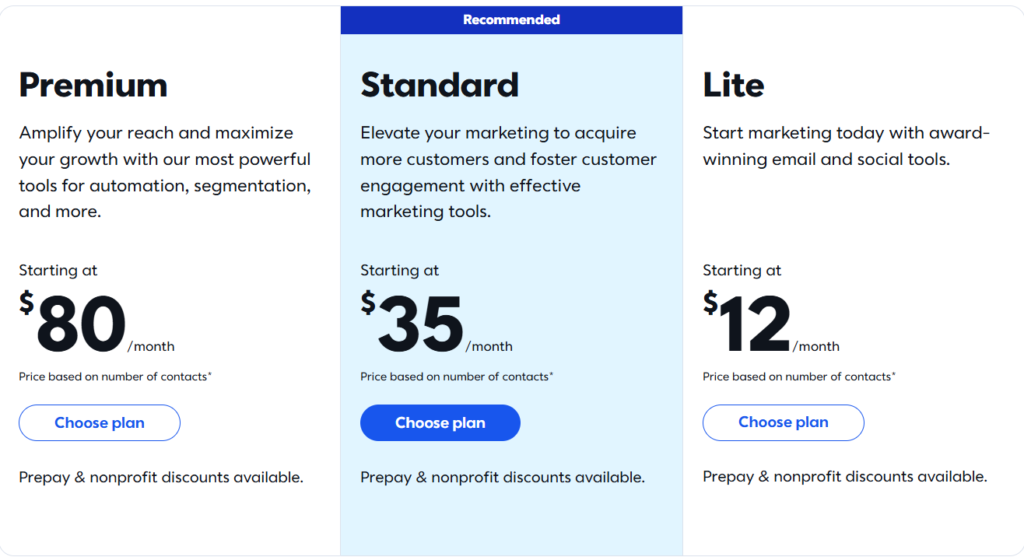
- Core Plan – Starts at $12 per month for up to 500 contacts, including basic email marketing tools.
- Plus Plan – Starts at $35 per month, offering advanced automation, conversion tracking, and eCommerce tools.
Constant Contact’s pricing increases based on the number of contacts, but it provides unlimited email sends on all plans.
Mailchimp Pricing
Mailchimp has a more tiered pricing model:
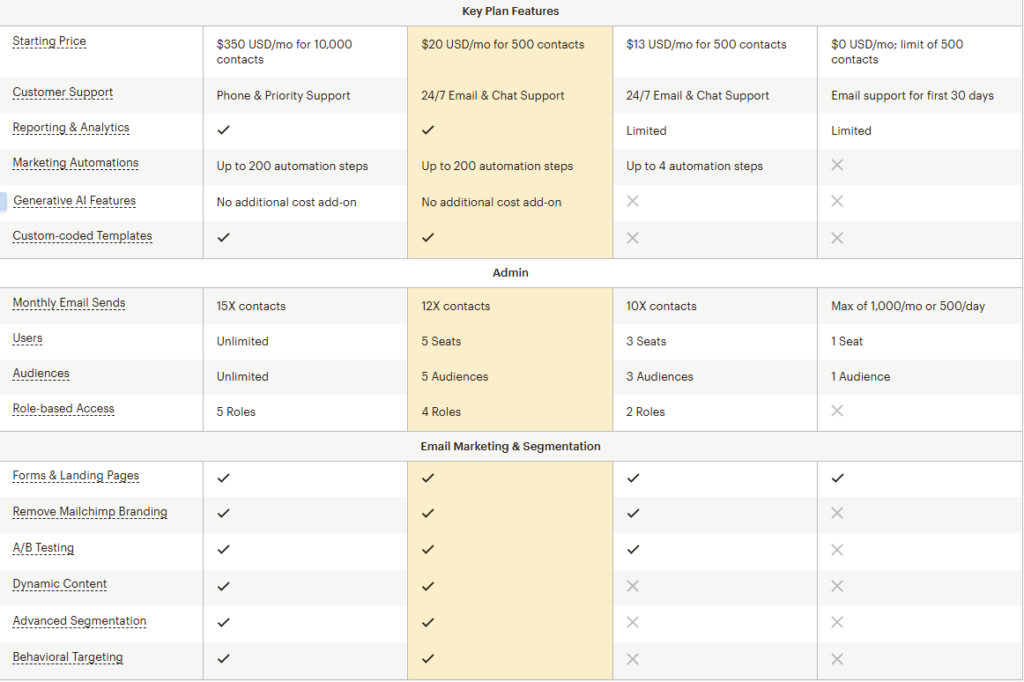
- Free Plan – Allows up to 500 contacts and 1,000 email sends per month, but with limited features.
- Essentials Plan – Starts at $13 per month, includes automation and A/B testing.
- Standard Plan – Starts at $20 per month, adding advanced segmentation and analytics.
- Premium Plan – Starts at $350 per month, offering full customization, priority support, and advanced automation.
Mailchimp’s pricing is also based on the number of contacts, but it has email send limits depending on the plan.
Which One is More Affordable?
- Constant Contact is better for businesses that send frequent emails since it offers unlimited sends.
- Mailchimp is more budget-friendly for small businesses or startups that don’t send emails frequently and need a free plan.
Ease of Use & Interface
When comparing Constant Contact vs Mailchimp, ease of use plays a crucial role, especially for beginners or small businesses without dedicated marketing teams. Both platforms provide user-friendly dashboards, but their overall experiences differ.
Constant Contact: Simple & Intuitive
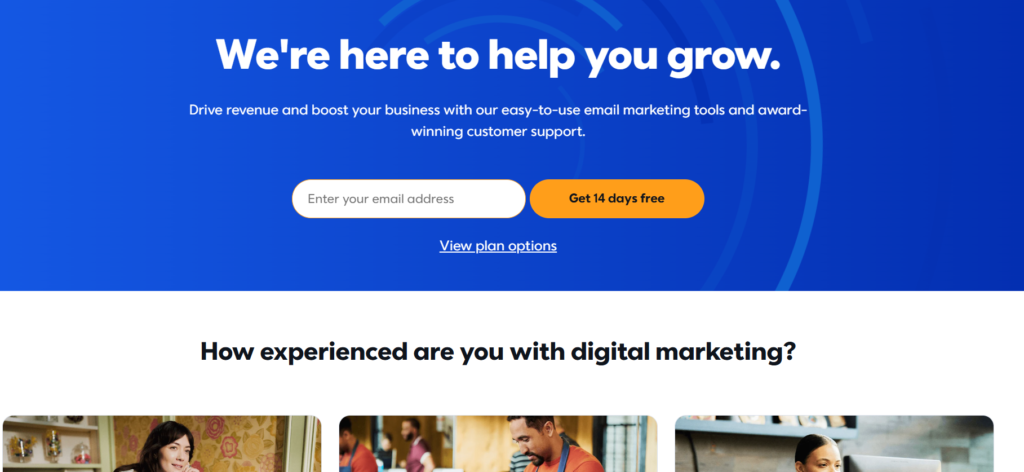
Constant Contact is known for its clean and straightforward interface, making it easy for beginners to navigate. Key features include:
- A drag-and-drop email builder that allows users to create emails quickly.
- A well-organized dashboard with clear menu options for campaigns, contacts, and reports.
- A step-by-step setup process for new users, guiding them through email creation, contact list setup, and automation.
Mailchimp: Feature-Rich but Complex
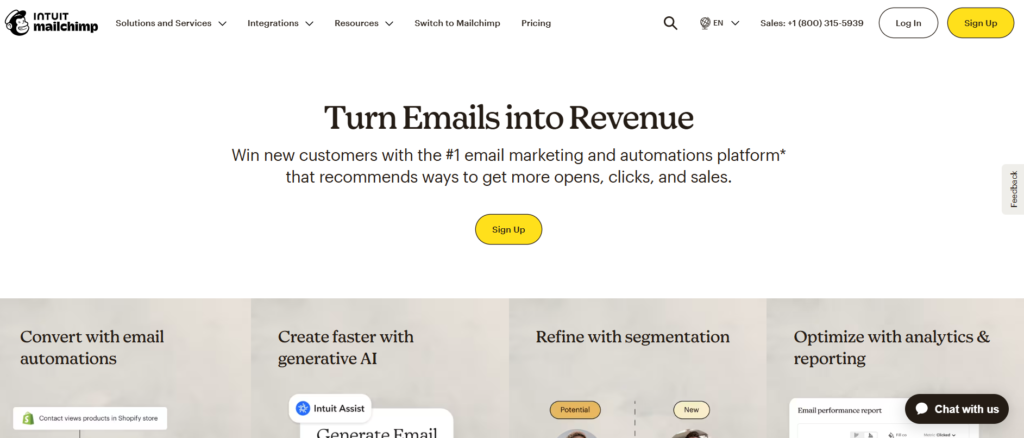
Mailchimp offers a more modern and visually appealing interface, but it comes with a slight learning curve. Features include:
- A highly customizable email builder with templates and AI-powered design recommendations.
- A comprehensive dashboard that integrates email marketing, social media ads, and analytics.
- Advanced automation and segmentation tools, which may feel overwhelming for beginners.
Which One is Easier to Use?
- Constant Contact is ideal for beginners or small businesses looking for a simple, no-fuss email marketing tool.
- Mailchimp is better suited for users who want more customization and advanced marketing features, even if it requires a bit more learning.
Email Templates & Design Flexibility
A well-designed email can make a big difference in engagement and conversions. In this Constant Contact vs Mailchimp comparison, we’ll explore how each platform handles email templates and design flexibility.
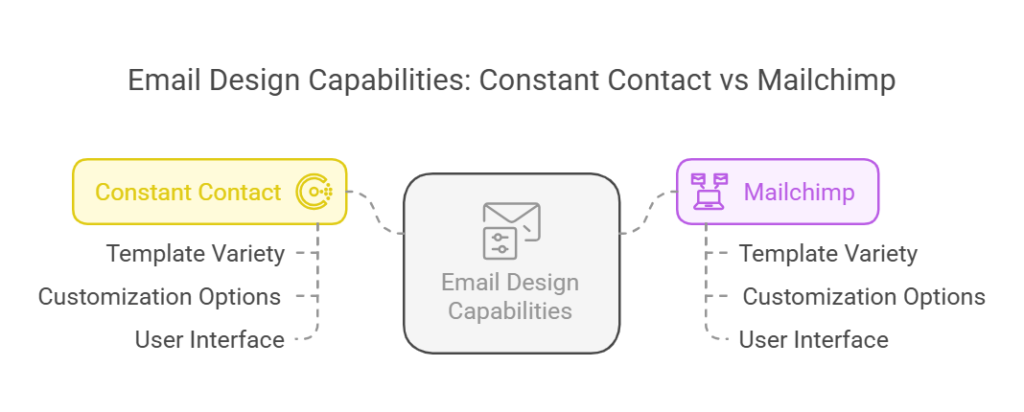
Constant Contact: Simple & Professional Templates

Constant Contact provides a wide selection of pre-designed templates that are clean, professional, and mobile-friendly. Key design features include:
- Over 200 email templates covering various industries and occasions.
- Drag-and-drop editor for easy customization, allowing users to change colors, fonts, and images without coding.
- Branding options that automatically pull your logo and brand colors for a consistent look.
While Constant Contact’s templates are easy to use, they may feel slightly less modern compared to Mailchimp’s designs.
Mailchimp: Highly Customizable & Creative
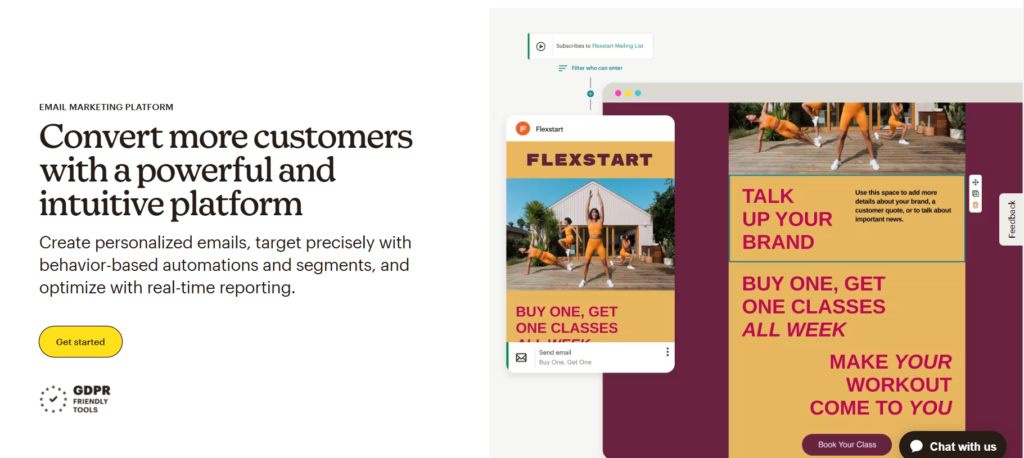
Mailchimp excels in design flexibility, offering:
- 100+ professionally designed templates, optimized for different business types.
- A more advanced email editor, allowing users to modify layouts with sections, columns, and unique design elements.
- AI-powered design suggestions that recommend styles based on brand identity.
- HTML customization, giving experienced marketers complete control over email designs.
While Mailchimp offers more creative freedom, beginners may find its editor slightly more complex than Constant Contact’s.
Which One is Better for Email Design?
- Constant Contact is great for users who want a straightforward, quick-to-build email design.
- Mailchimp is better for users who need highly customizable templates and have experience working with design elements.
Automation & Workflow Capabilities
Email automation is essential for businesses looking to engage their audience efficiently. In this Constant Contact vs Mailchimp comparison, we’ll examine their automation features, including ease of use, workflow capabilities, and advanced options.

Constant Contact: Basic Yet Effective Automation
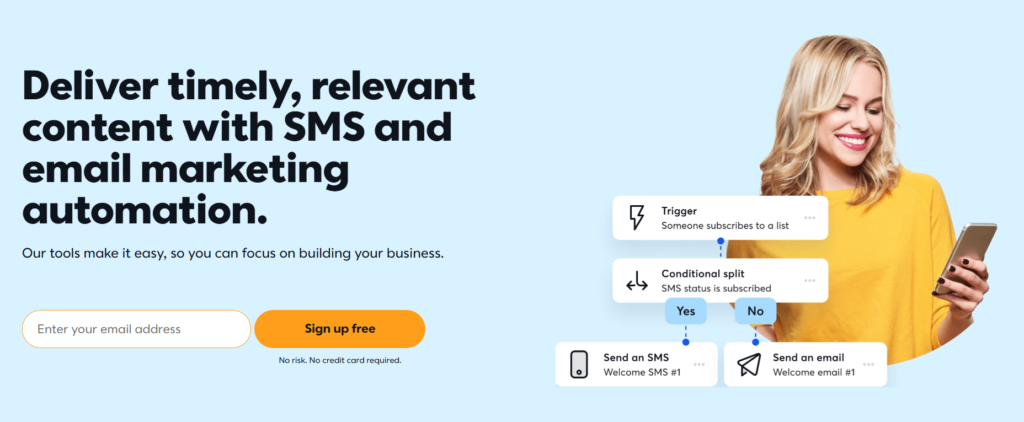
Constant Contact provides simple automation features that help businesses stay connected with their audience. Key automation tools include:
- Welcome emails for new subscribers.
- Drip campaigns to nurture leads over time.
- Birthday and anniversary emails for personalized engagement.
- Resend to non-openers to increase email reach.
While Constant Contact’s automation tools are easy to set up, they lack advanced triggers and customization options compared to Mailchimp.
Mailchimp: Advanced & AI-Powered Automation
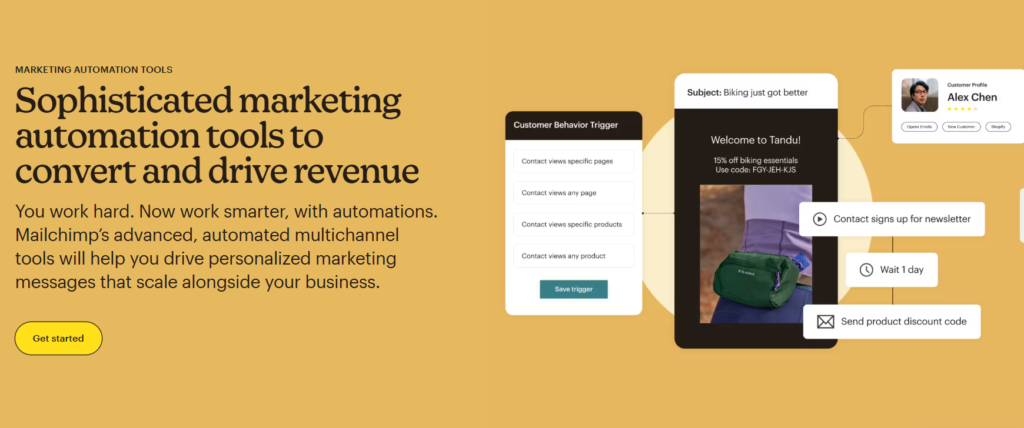
Mailchimp offers a more sophisticated automation system, making it a better choice for businesses with complex marketing needs. Its features include:
- Pre-built automation workflows for different industries and use cases.
- Behavior-based triggers, such as abandoned cart emails, purchase follow-ups, and re-engagement campaigns.
- AI-powered segmentation, which automatically categorizes subscribers based on their interactions.
- Multi-step workflows, allowing businesses to create detailed customer journeys with multiple conditions.
Mailchimp’s automation system is powerful, but it requires a learning curve to set up and optimize effectively.
Which One is Better for Automation?
- Constant Contact is best for users who need simple, no-fuss automation for basic email sequences.
- Mailchimp is ideal for businesses that want advanced automation with AI-driven features and deep customization.
List Management & Segmentation
Effective list management and segmentation are crucial for sending targeted emails and improving engagement rates. In this Constant Contact vs Mailchimp comparison, we’ll analyze how each platform handles contact organization, tagging, and advanced segmentation.

Constant Contact: Simple Contact Management
Constant Contact offers basic list management features that are easy to use for small businesses and beginners. Key features include:
- Manual and automatic list segmentation based on customer data.
- Tagging system to categorize contacts based on interests, purchases, or engagement.
- Pre-built segments for engaged vs. inactive subscribers.
- Contact import options from CSV files, Outlook, or Google Contacts.
While these tools are sufficient for general email marketing, Constant Contact lacks advanced behavioral segmentation and automation-based list updates.
Mailchimp: Powerful & AI-Driven Segmentation
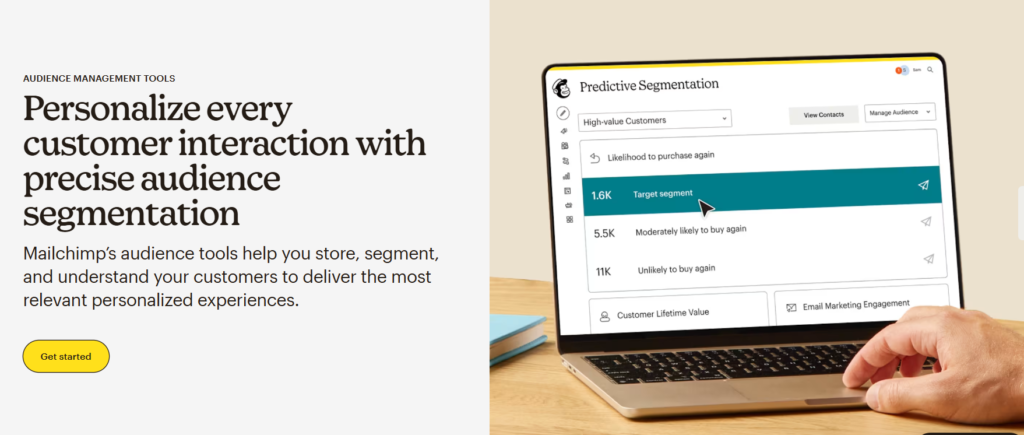
Mailchimp excels in list management and segmentation, offering more advanced tools:
- Dynamic segmentation that updates in real time based on user behavior.
- Advanced tagging system to create hyper-targeted email campaigns.
- Behavior-based audience segmentation, including purchase history, engagement levels, and website activity.
- Predictive insights powered by AI to help identify high-value subscribers.
Mailchimp’s AI-powered segmentation allows businesses to send more personalized emails, but it may feel complex for beginners.
Which One is Better for List Management?
- Constant Contact is great for users who want a simple, easy-to-manage contact list with basic segmentation.
- Mailchimp is better for businesses that need real-time audience segmentation and behavior-based targeting.
Deliverability Rates
Email deliverability is a key factor when choosing an email marketing platform. A high deliverability rate ensures that your emails reach your subscribers’ inboxes instead of landing in the spam folder. In this Constant Contact vs Mailchimp comparison, we’ll analyze their deliverability rates, authentication protocols, and email reputation.
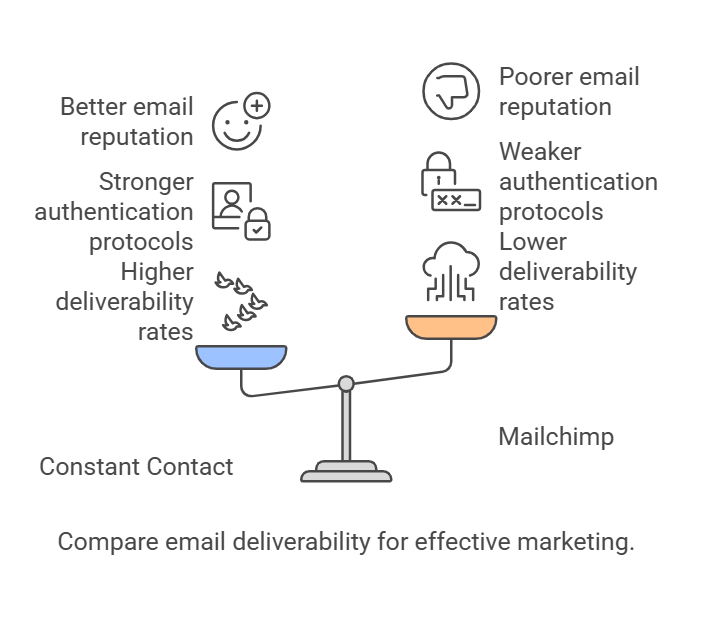
Constant Contact: Reliable and Consistent
Constant Contact has a strong reputation for high email deliverability, averaging between 85% and 97%. Key factors that contribute to its success include:
- Dedicated compliance team that monitors email performance and prevents spam complaints.
- Strong authentication protocols like DKIM, SPF, and DMARC to verify email authenticity.
- Built-in spam testing tools that help optimize emails before sending.
- Good sender reputation due to strict enforcement of anti-spam policies.
Constant Contact ensures consistent deliverability, making it a solid choice for businesses that want a reliable email service.
Mailchimp: AI-Powered Deliverability Optimization
Mailchimp also boasts high deliverability rates, ranging between 85% and 98%. Its advanced technology helps businesses improve inbox placement through:
- AI-driven deliverability optimization, ensuring emails reach engaged subscribers first.
- Automatic bounce handling, which removes invalid email addresses from lists.
- Spam score analysis, helping users improve subject lines and email content.
- Reputation management tools, which track open rates, click rates, and spam complaints.
While Mailchimp offers slightly better AI-driven optimization, deliverability rates depend on how well users manage their sender reputation and list hygiene.
Which One Has Better Deliverability?
- Constant Contact is ideal for businesses looking for consistent, reliable deliverability with built-in compliance support.
- Mailchimp is better for businesses that want AI-driven email optimization to maximize inbox placement.
Integrations & Third-Party Apps
Integrations are essential for connecting your email marketing platform with other tools like eCommerce platforms, CRMs, social media, and analytics. In this Constant Contact vs Mailchimp comparison, we’ll explore how well each platform integrates with third-party apps and which one offers more flexibility.

Constant Contact: Essential Business Integrations

Constant Contact provides hundreds of integrations, focusing primarily on small business tools. Key integrations include:
- eCommerce platforms – Shopify, WooCommerce, Big Commerce.
- CRM software – Salesforce, Zoho CRM.
- Social media & ads – Facebook, Instagram, Google Ads.
- Event management – Eventbrite for promoting and managing events.
- Website builders – WordPress, Wix, Weebly.
While Constant Contact covers essential business tools, its range of integrations is not as extensive as Mailchimp’s.
Mailchimp: Advanced & AI-Powered Integrations
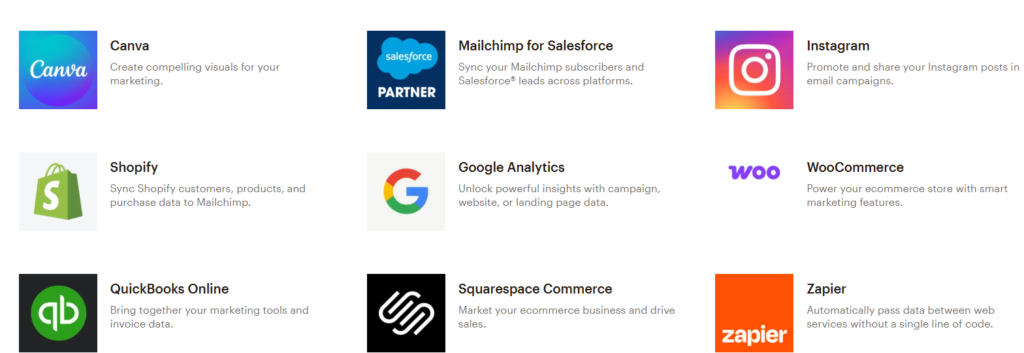
Mailchimp stands out with over 300 integrations, catering to businesses of all sizes. Some of its key integrations include:
- eCommerce platforms – Shopify, WooCommerce, Magento, Big Commerce.
- CRM software – HubSpot, Salesforce, Pipedrive.
- Social media & ads – Facebook, Instagram, Google, LinkedIn Ads.
- Advanced analytics & reporting – Google Analytics, Tableau.
- Automation & productivity tools – Zapier, Slack, Trello.
Mailchimp’s API capabilities allow developers to create custom integrations, making it more flexible for businesses with complex automation needs.
Which One Has Better Integrations?
- Constant Contact is great for small businesses that need essential integrations with eCommerce, CRM, and event management tools.
- Mailchimp is better for businesses that want advanced integrations, AI-driven analytics, and more customization options.
A/B Testing & Optimization Features
A/B testing is a crucial feature for improving email marketing performance. It allows businesses to test different elements of their emails—such as subject lines, content, and send times—to see what works best. In this Constant Contact vs Mailchimp comparison, we’ll evaluate how both platforms handle A/B testing and optimization.

Constant Contact: Basic A/B Testing
Constant Contact offers limited A/B testing features compared to Mailchimp. Key features include:
- Subject line testing, allowing users to test different subject lines for better open rates.
- Send time optimization, helping determine the best time to send emails for higher engagement.
- Basic email performance reports to track open rates and clicks.
However, Constant Contact does not support testing multiple email variations, content changes, or CTA button optimizations, making it less effective for deep campaign analysis.
Mailchimp: Advanced A/B & Multivariate Testing

Mailchimp provides more advanced testing and optimization features, making it a better choice for data-driven marketers. Its A/B testing capabilities include:
- Subject line, sender name, and content testing for deeper insights.
- Multivariate testing, allowing multiple variations of subject lines, content, and CTA buttons to be tested simultaneously.
- AI-powered send time optimization, which analyzes subscriber behavior to improve email delivery times.
- Detailed reporting and heatmaps to track engagement and optimize future campaigns.
Mailchimp’s A/B testing is far more comprehensive and data-driven, making it a strong choice for businesses looking to refine their email strategy.
Which One is Better for A/B Testing?
- Constant Contact is suitable for beginners who only need basic subject line testing.
- Mailchimp is ideal for businesses that want advanced A/B and multivariate testing to maximize email performance.
Customer Support & Resources
Reliable customer support is essential when using an email marketing platform, especially for beginners or businesses that rely on email campaigns for revenue. In this Constant Contact vs Mailchimp comparison, we’ll evaluate their customer support options, availability, and educational resources.
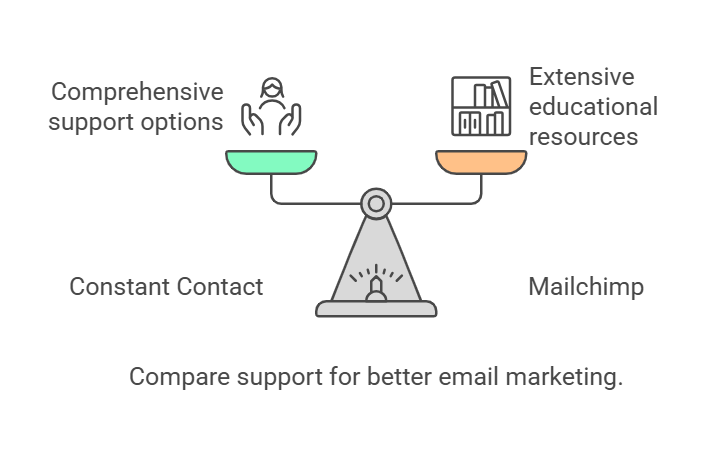
Constant Contact: 24/7 Phone & Live Chat Support

Constant Contact is known for its strong customer support, offering multiple ways to get help:
- 24/7 phone support (a rare feature in email marketing platforms).
- Live chat support available during business hours.
- Email support for non-urgent inquiries.
- Extensive knowledge base, including step-by-step guides, video tutorials, and community forums.
- Personalized onboarding, where new users receive assistance in setting up their first email campaign.
Constant Contact’s phone support is a major advantage, making it a great option for users who prefer speaking directly with a support representative.
Mailchimp: Self-Service Focus with Limited Direct Support

Mailchimp’s customer support is more limited, especially on lower-tier plans:
- 24/7 email and live chat support, but only for paid plans.
- Phone support is only available on the Premium plan ($350+ per month).
- AI-powered chatbot assistance for basic troubleshooting.
- Extensive self-help resources, including a large knowledge base, video tutorials, and community forums.
- Mailchimp Academy, offering in-depth courses on email marketing strategies.
While Mailchimp provides strong educational resources, its lack of phone support for most users can be frustrating, especially for beginners needing quick assistance.
Which One Has Better Customer Support?
- Constant Contact is ideal for users who prefer direct, real-time support through phone or live chat.
- Mailchimp is better for businesses that are comfortable with self-service help and online resources.
Pros & Cons of Each Platform
Both Constant Contact and Mailchimp offer powerful email marketing tools, but each platform has its strengths and weaknesses. In this Constant Contact vs Mailchimp comparison, we’ll break down the pros and cons of each to help you choose the right one for your business.
Constant Contact Pros:
- ✅ Easy to use: Intuitive interface with a simple drag-and-drop editor.
- ✅ Excellent customer support: 24/7 phone support, live chat, and email assistance.
- ✅ Unlimited email sends: All pricing plans include unlimited emails.
- ✅ Great for beginners: Step-by-step setup process and personalized onboarding.
- ✅ Essential integrations: Works well with eCommerce platforms like Shopify and WooCommerce.
Constant Contact Cons:
- ❌ Limited automation: Basic automation features compared to Mailchimp.
- ❌ Fewer templates: Template designs can feel outdated and less customizable.
- ❌ Pricing: Higher starting price for basic features compared to Mailchimp.
Mailchimp Pros:
- ✅ Free plan available: Suitable for startups and small businesses with up to 500 contacts.
- ✅ Advanced automation: AI-powered workflows and multivariate testing.
- ✅ Extensive integrations: Over 300 integrations, including eCommerce, CRM, and social media tools.
- ✅ Highly customizable templates: More design flexibility with HTML editing.
- ✅ Detailed reporting: In-depth analytics, including heatmaps and conversion tracking.
Mailchimp Cons:
- ❌ Limited support on lower plans: No phone support unless you’re on the Premium plan.
- ❌ Email send limits: All plans have monthly email sending caps, except Premium.
- ❌ Steeper learning curve: Advanced features can be overwhelming for beginners.
Which Platform Should You Choose?
- Choose Constant Contact if you need reliable support, simplicity, and unlimited email sends.
- Choose Mailchimp if you want advanced automation, flexible design options, and a budget-friendly free plan.
Conclusion – Which One Should You Choose?
Choosing between Constant Contact vs Mailchimp depends on your business needs, budget, and email marketing goals. Both platforms offer powerful features, but they cater to different types of users.
- Constant Contact is perfect for small businesses, beginners, and users who value simplicity, reliable customer support, and unlimited email sends. Its straightforward interface and 24/7 phone support make it an excellent choice for those who need hands-on assistance and easy-to-use tools.
- Mailchimp is ideal for businesses looking for advanced automation, in-depth reporting, and flexible design options. With its free plan and AI-powered features, Mailchimp is a great option for growing businesses, eCommerce stores, and marketers who want more control over their email campaigns.
Ultimately, if you need a platform that’s easy to use with strong customer support, go with Constant Contact. If you need advanced marketing tools, extensive integrations, and flexible pricing, Mailchimp is the better choice.
Both platforms have their strengths, and your decision should be based on which features matter most to your business.




